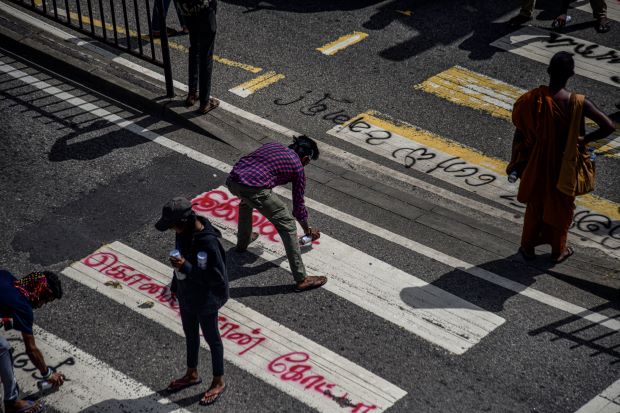Sri Lanka’s protesters remain defiant

By Mujib Mashal
COLOMBO —With no end in sight to the national economic crisis that led them to take to the streets, protesters in Sri Lanka are digging in against a president they blame for crashing the economy.
On Thursday (19), as hundreds of student protesters continued their call for the resignation of President Gotabaya Rajapaksa, they were met with police tear gas and water cannons. They endured this, and a monsoon downpour that followed, adding loudspeakers to amplify their chants and speeches expressing anger at the government.
“There is no solution but for the president to go,” said Naveendra Liyaanarachachi, 27, one of the demonstrators.
Sri Lanka, an island nation of 22 million people, is facing a dire economic crisis, with depleted foreign exchange reserves driving up the price of basic items.
On Thursday, Sri Lanka’s central bank confirmed that the country, which had been borrowing tens of billions of dollars over the years to feed the needs of a bloated system, had officially defaulted on its foreign debt.
The anger has been growing across the country as families have endured long lines for fuel, extended power cuts, and shortages of food and medicine.
For weeks, the agitation had remained largely peaceful, with protesters creating a tent city outside the administrative offices of the president in the capital, Colombo.
They called their protest site the “Gota Go” village — a play on the president’s nickname, Gota, and their main demand of him.
But tensions flared after supporters of the governing Rajapaksa family marched on the camps of the protesters this month, dismantling and burning their tents, which unleashed a wave of anger and violence across the country.
Rajapaksa has promised an investigation into the attack on the protesters, which was instigated by supporters of his brother Mahinda Rajapaksa, who was then the prime minister.
Police have begun arresting and questioning those suspected of instigating the attack, including members of Parliament belonging to the governing party, and those suspected of taking part in the widespread violence and arson that followed.
Protest leaders contend that police have also used the investigation as an excuse to clamp down on those associated with the demonstrators, arresting more than 300 of their supporters.
Gotabaya Rajapaksa has appointed a new prime minister, who is trying to raise funds from friendly countries and ease the economic hardship. But the protesters say that they will stay until their main demand — the president’s resignation — is met.
The protesters at the tent city quickly rebuilt their structures after the attack by the Rajapaksa supporters, putting up new tents in the place of ones burned down.
On any given day, particularly when the temperatures drop in the evenings, families arrive in large numbers to listen to speeches or to join in the chants and music.
-New York Times

